Unwelcome in Williamsburg
The Saga of Merchant Daniel Fisher
by Robert Doares
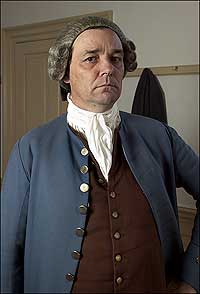
A merchant's immiseration. The once-hopeful Daniel Fisher, in the person of interpreter Ron Carnegie, was either an unlucky or a much disliked man. Virginia proved his undoing, not once but repeatedly.
All are welcome in Williamsburg today. The pineapple, by some regarded as a traditional symbol of hospitality, has become the city's trademark. But the place has not always been so friendly. For that we have the word of merchant Daniel Fisher, an eighteenth-century immigrant whose account of his reception trashes the old town's reputation for civility and fair play. According to Fisher, his neighbors cheated him, wrecked his home, looted his store, burgled him, and otherwise roundly traduced him. Whether he brought his troubles on himself or Virginians conspired to do him in, as he said, the place and its people confounded him time and time again.
We have the story, or some of it, from a journal Fisher kept from 1750 to 1755. Louise Pecquet du Bellet published a portion of it in her 1907 compendium, Some Prominent Virginia Families. In 1990, Colonial Williamsburg researcher Emma Lou Powers related some of Fisher's tribulations in her monograph, "Landlords, Tenants, and Rental Property in Williamsburg and Yorktown, 1730-1780." The tale begins with Fisher's departure with his family for Yorktown from London in May of 1750. It ends in August of 1755, as he rides his horse through the mud and mire of backcountry Maryland from Pennsylvania to Virginia, ready to give Williamsburg another try, though the place had already been his ruination. It's the tale of a man unwelcome in Williamsburg.
Copies of the eighteenth-century Virginia Gazette are replete with notices of the comings and goings of people of commerce or property, who traveled between Britain and the colonies in pursuit of prosperity. Such was Fisher. His first go at Virginia had been in the 1720s, when as a young man he served as deputy clerk of the county court in Yorktown. He returned to England about 1727, but more than twenty years later, Fisher decided to become a merchant and set out again for the Old Dominion, where he thought "trade in general was less intricate" and his prospects better.
He and his family boarded the ship Berry. Fisher considered himself well connected in Virginia. He traveled with letters of introduction from important Englishmen, including former Governor William Gooch, and enjoyed the friendship of Nathaniel Walthoe, clerk of the Governor's Council. His troubles started during the crossing. The Fishers found the provisions inadequate and became ill. They fell out with fellow voyagers—including their business partner. Their cargo was damaged. And matters would get worse.
Aboard happened to be John Randolph, attorney general of Virginia, whose characterization of his countrymen Fisher later recalled as an omen of things to come:
John Randolph in speaking of the disposition of the Virginian, very freely cautioned us against disobliging or offending any person of note in the Colony we were going to; for says he, either by blood or marriage, we are almost all related, or so connected in our interests, that whoever of a Stranger presume to offend any one of us will infallibly find an enemy of the whole, nor right nor wrong, do we ever forsake him, till by one means or other, his ruin is accomplished.Fisher stepped on the toes of some of the "connected" gentlemen as soon as he landed at Yorktown in August 1750. Grandees Thomas and William Nelson were among the first. Fisher's letter of introduction to them came from a man who had fallen from their favor. The Nelsons lent Fisher money, but were otherwise of no help. William Nelson chided the newcomer for being so weak minded as to give up life in Britain for no sound reason.
Fisher cut his losses in their town and pinned his hopes on Williamsburg. There Nathaniel Walthoe befriended the Fishers and helped them find a house to rent. It was on the edge of town, however, away from the center of commerce. In short order, Fisher moved to the English Coffee House, a larger building on the Duke of Gloucester Street near the Capitol—the site of today's Shields Tavern.
Fisher ran afoul of his landlord, tavernkeeper Henry Wetherburn, at the signing of the lease. The men had a spoken agreement that Fisher would have an option to renew, and that Wetherburn would keep the building in good repair. But the lease did not reflect it. Besides that, Wetherburn had sold to William Byrd the fine billiard table Wetherburn had promised would be at Fisher's disposal. Wetherburn took umbrage at Fisher's insistence that the lease be amended. But Walthoe and two other witnesses to the contract urged him to accept Wetherburn's promises on faith. Against his better judgment, Fisher signed.
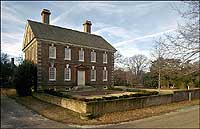
On his return to Virginia, Fisher first appealed for assistance from Thomas and William Nelson, whose house in Yorktown still stands. His letter of introduction, though, came from a man who had fallen from their favor since Fisher's arrival and did him little good. From this standing start, Fisher raced backward through a steeplechase of Virginia obstacles.
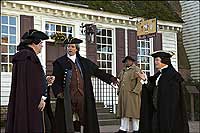
Fisher found himself caught up in personal ambitions and antagonisms. Local merchants John Greenhow and John Holt, portrayed by interpreters Ryan Fletcher, left, and Joseph Miller, right, joined battle against the outsider Fisher. Both proved capable enemies to Fisher and his attempts to prosper in Williamsburg. Interpreter James Ingram is the passerby in the back.
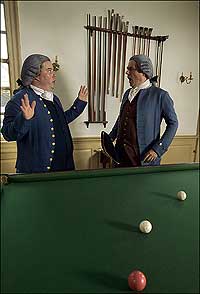
Fisher rented a house from the taverner Wetherburn—interpreter Gary Sandling on the left—but came to regret it. Promises to keep the house in good repair and allow Fisher the use of a billiard table evaporated.
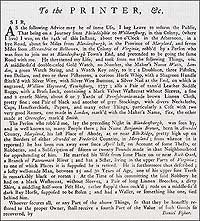
Fisher broadcast the end of his colonial trials in the Virginia Gazette, asking for the return of goods stolen by a Benjamin Brown. Lawsuits, dispossession, abandonment by his family, and here a humiliating robbery traced the descending arc of Fisher's American life.
Fisher operated a tavern in the building briefly, but soon devised the more lucrative arrangement of subletting rooms in a small part of the house, while dealing in "Coffee, Tea, Chocolate, Arrack, Claret, Madeira, and ...several other articles" in the rest. According to Fisher, his "flourishing situation unhappily attracted the envy and rancour" of the townspeople. The first gentleman to cause trouble was Colonel Philip Lee, who tried to force the Fishers out of the property so he could rent it himself. When Fisher complained of the harassment to Wetherburn, his trepidations about his landlord were confirmed. Wetherburn let it be known that though he would not turn Fisher out of the place, he had no intention of making any repairs to the house so long as Fisher was there. Though Walthoe remembered Wetherburn's promise to the contrary, neither of the other two witnesses to the agreement seemed able to recall the terms. At least one owed Wetherburn money.
Then came a public fracas with merchants John Greenhow and John Holt. Holt, who happened to be mayor at the time, filed a complaint in the county court, accusing Fisher of the illegal sale of rum to blacks. The vigor with which Fisher defended himself caused a hubbub in the chamber. He said it was Holt and Greenhow who sold rum to African Americans. The court dropped the case.
Holt found opportunity to settle the score with Fisher in April of 1754 when a fire broke out on the east end of Williamsburg, in a store next to Walthoe's home and two doors from Fisher's establishment. A barrel of gunpowder exploded, scattering sparks and setting Walthoe's house ablaze. To the east, the Capitol, rebuilt after the conflagration that consumed it in 1747, was threatened anew.
Though a strong west wind pushed the fire east and away from Fisher's on the west, Mayor Holt ordered a crowd of slaves to dismantle Fisher's house "for the Public good," to keep the fire from spreading further. Fisher watched the mob break open and loot the place of its contents. The mayor's minions had pulled down part of the house before a Mr. Grymes stepped forward and ended the demolition as well as the blaze. Afterward, Fisher lamented the impossibility of computing "the damages I sustained in this unparalleled depredation of my goods and every commodity I dealt in as well as liquors."
Wetherburn refused to repair the damage to Fisher's house and fence, leaving him "open and exposed to many injuries" for the rest of the year. Fisher wrote, "My habitation was broke open the ensuing winter no less than five times and I robbed of things of considerable value." Two months after the fire and a ruckus over possession of a tea table with Mrs. Holt, Fisher's wife had had enough. She "separated bed and board" from her husband and took up residence elsewhere with her children. By May of 1755, with his marriage and his expectations for Williamsburg in shambles, Fisher set his sights elsewhere, too. Ruling out a return to England, he wrote, "I turned my mind toward my former plan of going to Philadelphia."
With a gift of money from Walthoe, Fisher rode to the City of Brotherly Love in ten days on horseback, arriving May 22, 1755. He planned to spend weeks assessing his prospects for employment. Pursuing leads that invariably were dead, and running low on cash, he despaired of finding himself a niche until he applied to Benjamin Franklin, "a gentleman in good esteem here and well known to the Philadelphical world." Franklin took a liking to Fisher, helped him find suitable lodging, and hired him to do copy work in his print shop.
Franklin planned to help Fisher find more lucrative employment in town, perhaps as a teacher in an academy. But Fisher cut his stay short when he received a letter of good tidings from Walthoe in Virginia. Walthoe reported the bankruptcy of the renter of his own store, to which Fisher would be most welcome, should he wish to attempt to re-establish himself in Williamsburg. From the letter Fisher also learned that his family, in the words of his journal, "had now manifested an entire conformity to my will, either to embrace the opportunity ...or if I was better pleased with the prospect that Philadelphia afforded, they would remove thither upon the first notice." Fisher left Philadelphia, headed south, on Sunday morning, August 10.
Fisher's last journal entry is dated August 14. It describes a two-hour tavern breakfast in Bladensburg, Maryland, after which he set out to cross the Potomac into Virginia. A fellow lodger proposed to accompany him four or five miles, and they "rode together very sociably." The pair are considering a fork in a river road when the journal ends with Fisher's own note: "See next Book." The transcript says that the second volume had gone lost by the time of the journal's discovery by a Fisher descendant in 1857.
What seems to be the end of the story, however, isn't.
We'd know no more of Fisher's travels along the Potomac that day but for the survival of a copy of the Virginia Gazette from September 5, 1755. Among the advertisements appears a notice with a Williamsburg byline and the date of August 30. The item says:
I was, on the 14th of this Instant, about two o'Clock in the Afternoon ...robb'd by a person who was seen to join me at Blandensburgh Town's End, and pretended to be going the same Road with me. He threatened my Life, and took from me the following Things, viz. A middle-siz'd double-cased Gold Watch ...a green Watch String, and a Watch Key only, to it; a Doubloon, three Pistoles, two Dollars, and two or three Pistereens, a curious Horse Whip. . . ; also a Pair of tann'd Leather Saddle Baggs, with a Brass Lock, containing a black Velvet Wastecoat without Sleeves, a fine and 2 coarse Shirts, about 6 or 7 yards of Pennsylvania-made brown Linnen Cloth, pretty fine; one Pair of black and another of grey Stockings, with divers Neckcloths, Caps, Handkerchiefs, Papers, and many other Things, particularly a Case with two very good Razors . . .Having lost the fruits of his labor yet again, Fisher should have been downcast by the time he reached Williamsburg a few days later.The person who robb'd me ...his Name Benjamin Brown, born in Arundel County, Maryland ...has been run away ever since April last, on Account of some Thefts, or Robberies, and a Subscription of fifteen or twenty Pounds made in that Neighbourhood for apprehending him ...a lusty, well-made Man, between 25 and 30 Years of Age, one of his upper fore Teeth is remarkably black or rotten . . .
Whoever secures all, or any Part of the above Things, so that they be honestly restored to the proper owner, shall receive a fourth Part of the Value of such Goods so recovered, by Daniel Fisher.
I'm just glad Brown didn't pinch the journal.
Bob Doares's story on the Virginia Society for the Promotion of Useful Knowledge appeared in the autumn 2003 issue of the journal. Doares is an instructor in Colonial Williamsburg's department of interpretive training.
